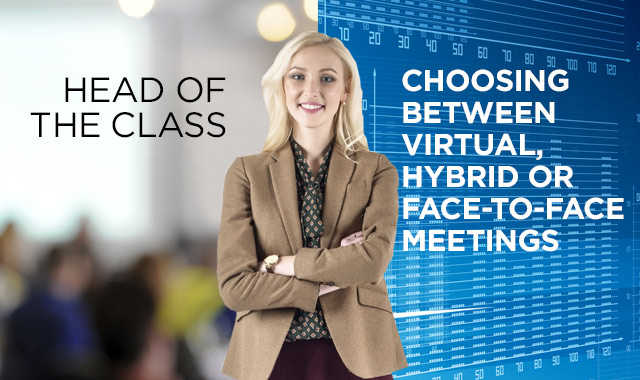Steph Pfeilsticker is an award-winning innovator with more than 17 years of event industry experience. She founded Hybrid Events Authority to share her hybrid meeting expertise with organizations seeking powerful results that are brought about by adding a virtual element to their meetings. The industry has taken notice of Steph’s work. In addition to being named a Top 20 Changemaker by Corporate Meetings & Incentives magazine and nominated for the Top 5 Women in Event Tech, she has been the recipient of 7 awards from MPI, ISES and RSVP magazine. Steph received an undergraduate degree from Valparaiso University in Valparaiso, Indiana and an MBA from Bethel University in St. Paul, MN.
Head of the Class — Choosing between Virtual, Hybrid, or Face-to-Face Meetings
Like most industries, meeting and event planning has evolved to correspond with ever-expanding, always-changing technology. However, learning how to utilize that technology to its greatest effectiveness can prove something of a challenge. In fact, sometimes you end up feeling like a school kid on the wrong side of the bell curve. If you want to be at the head of the class and hold effective meetings tailored to your objectives and your specific audience, Steph Pfeilsticker, Chief Hybrid Strategist at Hybrid Events Authority, offers her advice on choosing between virtual, hybrid or face-to-face meetings.
Q. Tell me about your company and what you do there.
A. I’d been in the meeting and event planning industry for 16 years when I noticed there was a need for a different type of planning service. I launched Hybrid Events Authority because I saw a big opportunity for planners to use hybrid meetings to reach a larger audience. In my position as Chief Hybrid Strategist, I help planners choose the appropriate platform and streaming technology, design their agenda for a virtual audience, and execute the event onsite. Studies indicate that once someone has participated in a virtual event, they’re more likely to attend that same event in person the following year. In this way, planners can anticipate greater in-person meeting attendance over the long term when they stream their in-person meeting to those who cannot attend.
Q. What is the difference between Virtual, Hybrid and Face-to-Face meetings?
A. Face-to-face meetings are in-person meetings that people choose to physically attend. A hybrid meeting is an in-person meeting that is streamed over the internet to a virtual audience viewing from their home or office. A virtual meeting is conducted exclusively online.
Q. What circumstance would dictate choosing one meeting type over another?
A. Content-rich meetings without a significant focus on interaction are good candidates for hybrid meetings. It should be noted that when you are streaming your meetings, you do need to incorporate chat, polls, and question-asking to keep the virtual participants engaged in the content. A virtual meeting generally takes place when the speaker or facilitator is in one location and the audience are in a variety of different locations. However, a meeting that requires interaction, along with networking and one-on-one contact, is best done face-to-face.
Q. Is one type trending more than the others? If so, why?
A. There is an increase in the number of hybrid events. More planners are seeing the value of extending their message to a virtual audience unable to attend in person. I believe we’ll see extensive growth in these hybrid events over the next 18-24 months. Based on technology curves and how many planners are utilizing virtual streaming, hybrid is seeing the most expansion moving forward.
Q. Is there one meeting type that generally outperforms another or is more successful?
A. The value of a face-to-face meeting just can’t be beat. However, hybrid meetings extend your audience out further, offering you the opportunity for additional growth. These types of meetings will attract people who wouldn’t normally attend a face-to-face meeting, and exposes them to your message. Based on my hybrid events, between 31-54% of hybrid attendees choose to attend a future fact-to-face meeting after attending a hybrid meeting. As such, they are proven attendance drivers!
Q. Any other advice or suggestions?
A. If a planner is having a meeting that must provide great quantities of information and is not exclusively about networking, then I would encourage them to try a virtual or hybrid meeting. They can get started by streaming their meeting’s keynote sessions. Once they gain experience in how it works, they might consider streaming their entire meeting the following year.










